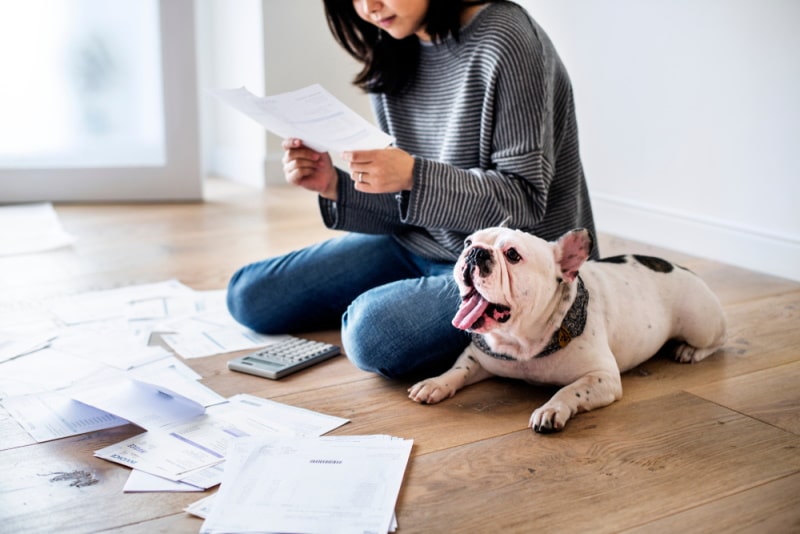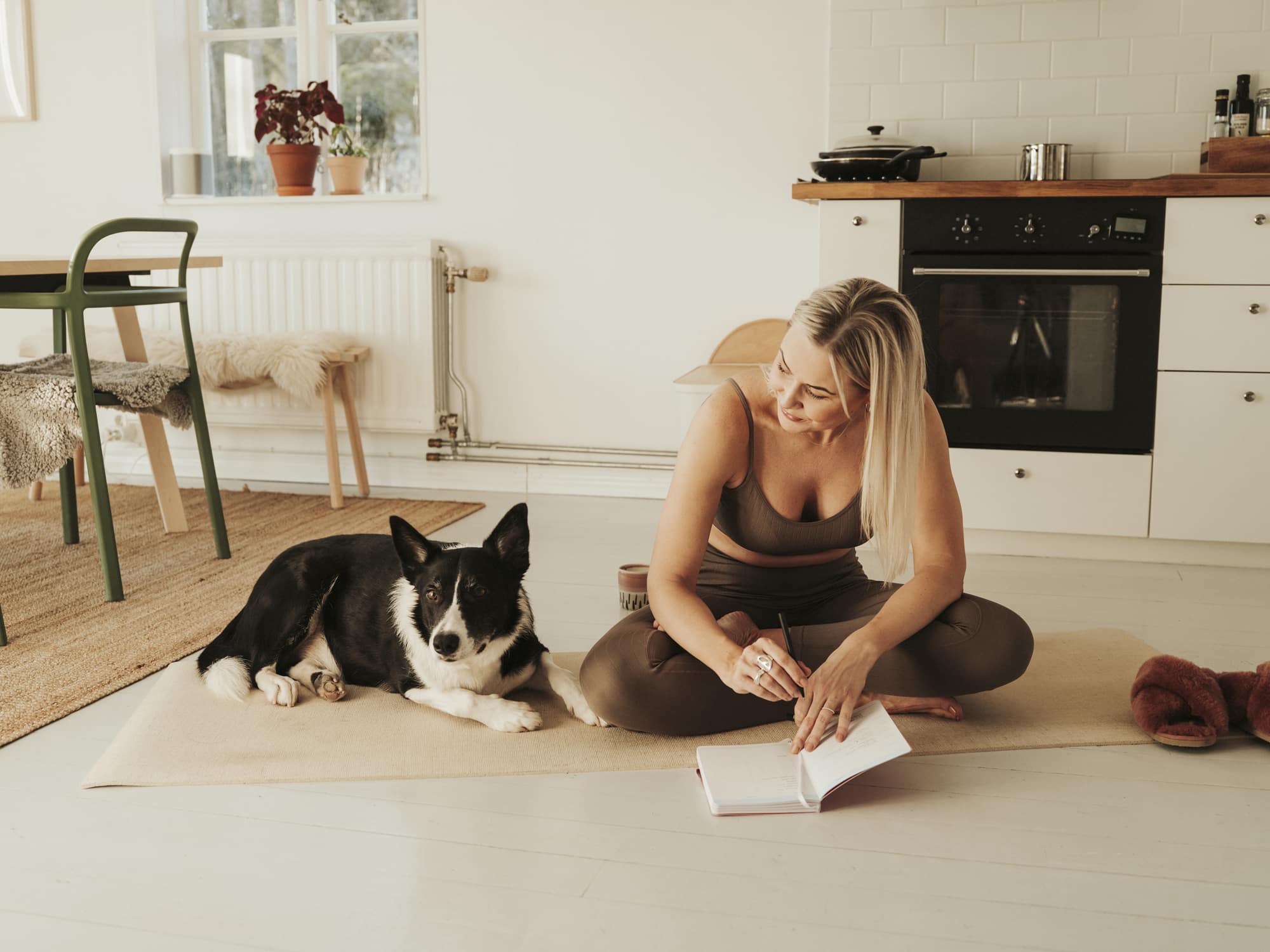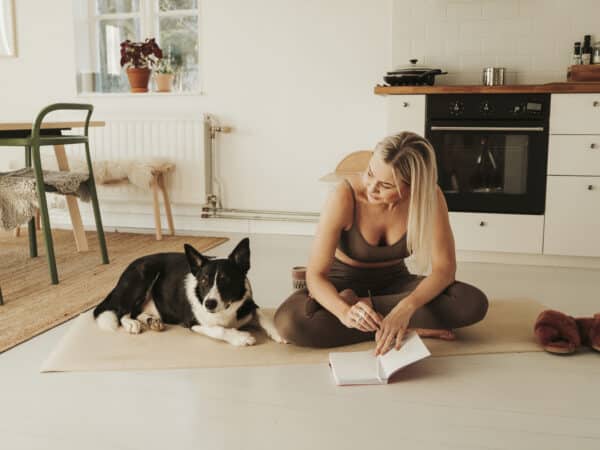Tracking your own health by journaling is a helpful, proactive step toward better-managed care and clear communication across healthcare provider teams. The same is true for our fur family.
Journaling health information such as vaccinations, medications and tracking recurring issues gives front row seating to your dog’s health and wellness and allows easy access in an emergency or for a pet sitter situation.
What to include in your dog’s health notes
Vet and emergency contacts and microchip information are important documents to locate in a pinch. Food brand and feeding amount (or food allergies), flea and heartworm prevention schedules, plus any abnormal health symptoms are also helpful to have written down and solidified in one place says Dr. Sue Yanoff, Board Certified Orthopedic Surgeon.
A journal or log can be as detailed or as simple as you’d like, yet ideally personalized to fit your dog’s health needs and situation, advises Dr. Yanoff, who also teaches classes on canine performance health to dog sports enthusiasts.
Since one of our dogs is a senior Lab, I journal mobility supplements and any related effects. Lumps and lipomas are tracked using a sketch of her body, including vet visit receipts noting any important comments. Everything is bound in a 3-ringed binder.

Journaling helps with your dog’s physical health wellness
Dr. Yanoff journals all physical activity daily for her two Beagles, 10-year-old Ivy and 3-year-old Quinn. Their very active lifestyle of agility training and two-hour-long hikes along railroad beds can lead to injuries. Since her specialty is in sports medicine, recording daily exercise activity is beneficial with her own dogs.
“I can look back and have some concrete evidence as opposed to relying on my memory,” she says. Her dog journal is a simple spiral notebook that lives on her kitchen countertop. Entries for this journal began in 2016. And in only minutes a day, using short phrases, she jots down the date, length of daily activities (or no activity at all), changes in movement and when a rest day is needed. Her pet sitter has easy access to the log and will note anything unusual. The journal goes with them when traveling with her dogs.
“So, something I ask my clients is, ‘What is the first thing you noticed? And when did you notice it?’ And some of them do have written documentation and some of them, it’s, ‘Well, I think it was around the time of spring, but I’m not sure,’” says Dr. Yanoff.
Keeping dog health records
Based on common questions for her dog parents, Dr. Yanoff recommends recording a starting date for:
- All medications, including a stopping date
- Vaccines and any reactions
- Vomiting
- Sneezing
- Coughing
- Changes in appetite
- Diarrhea
- Changes in attitude, reluctance to do daily activities
- Skin growths and lumps, especially for seniors (A simple outline sketch of your dog with location, date and size.)
“And then when you notice, ‘Man, that’s not right,’ you have a log. You could go back in your log and know, on such and such I thought this was a little strange … It’s nice to have all this information at your fingertips.”
Journaling helps with your dog’s behavioral wellness
Dr. Jennifer Summerfield, CPDT-KA – AVSAB specializes in behavior issues. She frequently asks that clients journal behavior issues with dates, how long the incident lasted and anything unusual that happened beforehand. Our fur companions can already be on edge from something that happened earlier in the day, just like us, she says.
Whether it’s a seizure, anxiety or housemate dog-to-dog aggression, identifying triggers and tracking frequency becomes a super helpful tool for you and your vet. “Sometimes the patterns that come up once you start looking at it might not always be obvious,” Dr. Summerfield says. Writing down what happened prior to an incident helps spot possible triggers. Without clues on contributing factors, addressing behavior issues is difficult.
“We’re tracking frequency on those things … It’s hard to know if what you’re doing is helping unless you actually have dates written down that you can refer back to.”
Dog health wellness notes expanded
Don’t forget games your dog enjoys. Fun activities give them something to do, helping them relax if their routine changes. Games and rewarding activities alleviate stress and reinforce positive sitter interactions. Write down activities that your pup already knows, not something needing to be trained, Dr. Summerfield advises. “Include something that’s part of their daily routine that they can still do, even if they’re not doing it daily,” she says.
Suggestions for dog wellness activities include:
- Stress reliever games (fetch)
- Fun activities (snuffle mats)
- Favorite toys
- Food puzzles
- Enrichment activities (scatter feeding)
- Daily walks (when, how long and where)
- Calming supplements or behavior meds
- Dislikes, thunderstorms, loud sounds or off-limit petting areas such as ears
Depending on your dog’s specific health or behavioral issues, she also suggests writing down how you normally handle these situations, such as anxiety or aggression.
With a newly adopted shelter rescue at our house, I write down any aggression shown by either dog. Noting what happened just before the disagreement helps me in understanding what tipped the threshold scale and how to better manage the situation in the future. That way sitters have an idea of what to expect if those situations come up while they’re staying with the dog, and an idea of some strategies that might be helpful to calm them, if needed.
How to find journals for your dog’s health records and notes
Smartphone apps are available for the tech-savvy, such as Pawprint and DogLog for Android and iOS. Pawprint stores microchip info, flea and heartworm reminders, vaccination records and food recall updates. (Several features are in-app purchases.) DogLog will send reminders for medications and vet visits. This content can be shared with others.
A web browser search for “dog health journal” fetches a range of doggie journals for all stages of life from online bookstores, such as Barnes and Noble and Amazon. Many independent bookstores often have an online search tool, which is an ideal way to shop local.
“Dog Log: Daily Pet Health Care Record Book For Puppy & Dogs” by Amy Newton includes prompts for surgery history, vaccines, grooming and daily activities.
For the DIY-er, creating your own version gives more wiggle room for creativity and customization to fit specific needs. Etsy offers affordable digital downloads for both health journals and wellness trackers. Our journal is a DIY-er using a three-ringed binder with tabbed dividers for each dog’s health information, including pocket folders for vaccine records and clear sheet protectors that hold vet receipts. Pages are Etsy downloads and plain notebook paper for additional notes, such as behavioral concerns.
Vibrant or plain, detailed or broad, journaling gives a panoramic view of health and well-being, a road map through time for all stages from puppies to seniors. Life happens. Memories tangle. As you invest in the process, journaling helps untangle and ensure a better quality of life with your fur baby.
- Blank, commercially bound journals
- Pinterest — Ideas on journaling
- Three-ring binders, great for adding or removing pages
- Bright, colorful paper for printing different sections
- Pocket folders for vaccination/vet health records
- Washi tape (trendy, Japanese tape made of rice paper) for color & design
- Art pens (felt & brush tip) for a creative spin
- Dog Log: Daily Pet Health Care Record Book for Puppy & Dogs, Track Vet Visits & Vaccination
- Journal, Medical and Important Information by Amy Newton
- My Dog’s Health Record Book: A Practical Guide to Log Your Dog’s Personal and Health History, With Tips For New Puppy Owners by Leila Grandemange
- Dog Record Book: Dog Health And Wellness Log Book Journal, Vaccination & Medication Tracker, Vet & Groomer Record Keeping, Food & Walking Schedule by Teresa Rother
- Geriatric Dog Health & Care Journal: A Complete Toolkit for the Geriatric Dog Caregiver by Dr. Mary Gardner, DVM
- My Pawsome Dog and Me Journal: Celebrate Your Dog, Map Its Milestones And Track Its Health And Well-Being by Charlie Ellis (release date April 4, 2023)
About the Author: Cindy writes about all things dog for numerous national publications. When she is not writing, she trains her own two dogs, Bella and Ozcar — both rescues, for AKC sports. She enjoys reading and spends time organizing after a long teaching career. You can follow her on Instagram @cyhowle.








